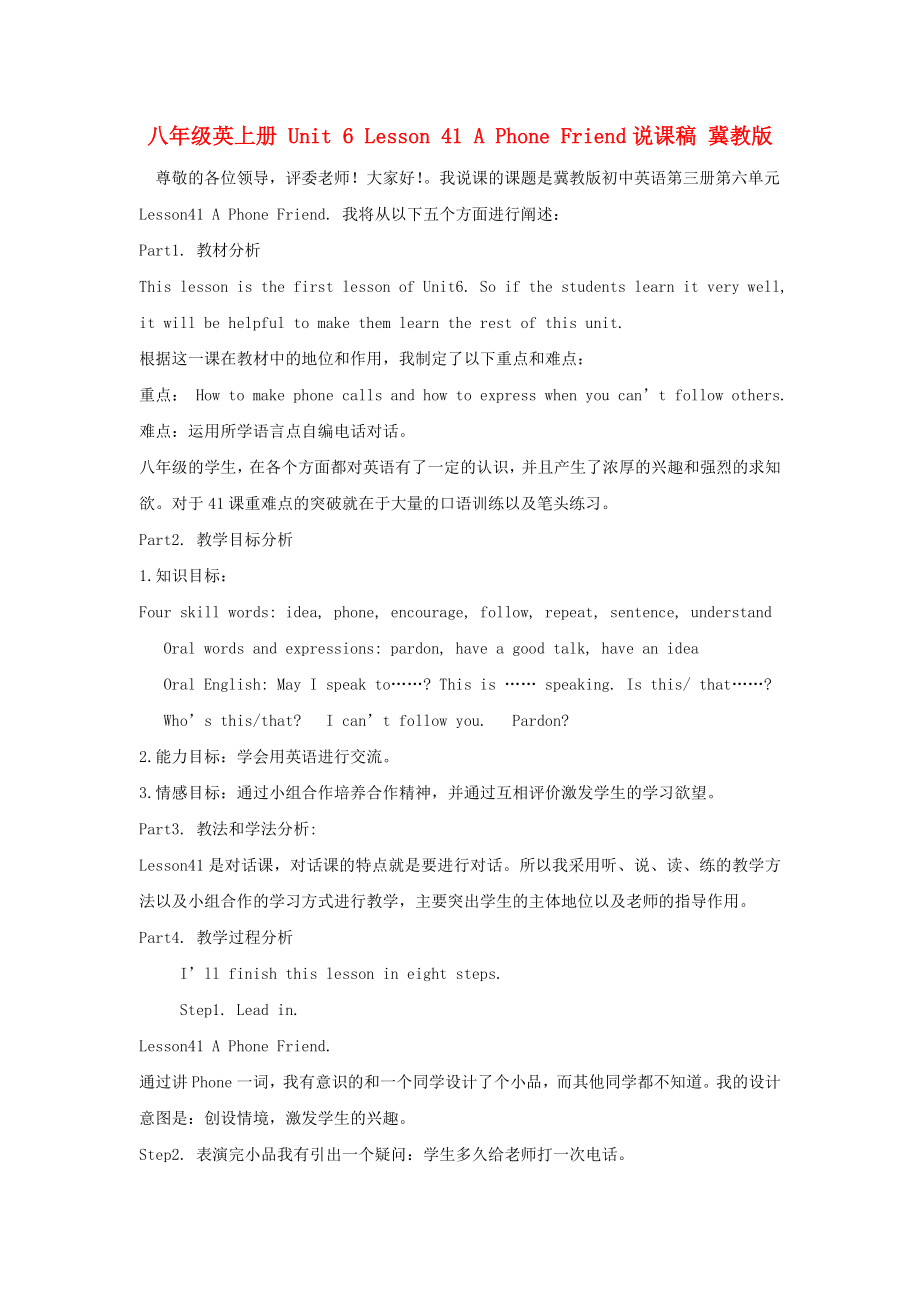《八年級(jí)英上冊(cè) Unit 6 Lesson 41 A Phone Friend說課稿 冀教版》由會(huì)員分享,可在線閱讀���,更多相關(guān)《八年級(jí)英上冊(cè) Unit 6 Lesson 41 A Phone Friend說課稿 冀教版(3頁珍藏版)》請(qǐng)?jiān)谘b配圖網(wǎng)上搜索���。
1���、八年級(jí)英上冊(cè) Unit 6 Lesson 41 A Phone Friend說課稿 冀教版
尊敬的各位領(lǐng)導(dǎo),評(píng)委老師���!大家好���!。我說課的課題是冀教版初中英語第三冊(cè)第六單元Lesson41 A Phone Friend. 我將從以下五個(gè)方面進(jìn)行闡述:
Part1. 教材分析
This lesson is the first lesson of Unit6. So if the students learn it very well, it will be helpful to make them learn the rest of this unit.
根據(jù)這一課在教材中的地位和作用���,我
2���、制定了以下重點(diǎn)和難點(diǎn):
重點(diǎn): How to make phone calls and how to express when you can’t follow others.
難點(diǎn):運(yùn)用所學(xué)語言點(diǎn)自編電話對(duì)話。
八年級(jí)的學(xué)生���,在各個(gè)方面都對(duì)英語有了一定的認(rèn)識(shí)���,并且產(chǎn)生了濃厚的興趣和強(qiáng)烈的求知欲。對(duì)于41課重難點(diǎn)的突破就在于大量的口語訓(xùn)練以及筆頭練習(xí)���。
Part2. 教學(xué)目標(biāo)分析
1.知識(shí)目標(biāo):
Four skill words: idea, phone, encourage, follow, repeat, sentence, understand
Oral words
3���、and expressions: pardon, have a good talk, have an idea
Oral English: May I speak to……? This is …… speaking. Is this/ that……?
Who’s this/that? I can’t follow you. Pardon?
2.能力目標(biāo):學(xué)會(huì)用英語進(jìn)行交流���。
3.情感目標(biāo):通過小組合作培養(yǎng)合作精神,并通過互相評(píng)價(jià)激發(fā)學(xué)生的學(xué)習(xí)欲望���。
Part3. 教法和學(xué)法分析:
Lesson41是對(duì)話課���,對(duì)話課的特點(diǎn)就是要進(jìn)行對(duì)話。所以我采用聽���、說���、讀、練的
4���、教學(xué)方法以及小組合作的學(xué)習(xí)方式進(jìn)行教學(xué),主要突出學(xué)生的主體地位以及老師的指導(dǎo)作用���。
Part4. 教學(xué)過程分析
I’ll finish this lesson in eight steps.
Step1. Lead in.
Lesson41 A Phone Friend.
通過講Phone一詞���,我有意識(shí)的和一個(gè)同學(xué)設(shè)計(jì)了個(gè)小品���,而其他同學(xué)都不知道。我的設(shè)計(jì)意圖是:創(chuàng)設(shè)情境���,激發(fā)學(xué)生的興趣���。
Step2. 表演完小品我有引出一個(gè)疑問:學(xué)生多久給老師打一次電話。
我的設(shè)計(jì)意圖是:使課堂過度到���?��!癟hink About It”
Step3. e to “Thin
5、k About It”
Guide the students to answer the first question in English. If they can’t answer the second, they can answer it in Chinese.
Step4. Listen an d answer.
Books closed! Listen to the tape and answer the two questions:
What does Wang Mei want to do? When do they make a telephone?
我
6���、的設(shè)計(jì)意圖是:訓(xùn)練學(xué)生的聽力能力���。
Step5.Listen and read.
Books open. Listen and repeat the text. Then ask the students to read it silently and find the new words, phrases and the phone language. Then I can write them on the blackboard with the help of the students, such as:
New words Ora
7、l English
idea May I speak to……?
encourage This is……speaking.
follow Who’s this/that?
give a good talk Is this/that……?
have an idea Pardon���?I can’t follow you.
Point to them on the blackboard and say to the
8���、 students: We must pay attention to these words and oral English and try to use them freely.
我的設(shè)計(jì)意圖是:訓(xùn)練學(xué)生的聽���、說、讀以及閱讀理解的能力���。
Step6. Work in groups.
Divide the class into several groups. Each group has four people. Practice the text in groups of four. Ask them to try to act it out in front o
9���、f the class. They can use their own hands as telephones. Six minutes later, check several groups and give them scores and see which group is the best.
我的設(shè)計(jì)意圖是:以小組合作以及競(jìng)爭(zhēng)意識(shí)來充分調(diào)動(dòng)學(xué)生的積極性和主動(dòng)性,并且在輕松愉悅的氛圍中突破重難點(diǎn)���。給學(xué)生一個(gè)展示的空間���,同時(shí)也鍛煉了學(xué)生的口語表達(dá)能力。
Step7. Practise in class.
I design A and B exercises for the
10���、 class.
Exercise A is about the words and expressions. It’s easy for all the students.
Exercise B is a dialogue with some blanks. It’s a little hard for several students. Ask them to do the exercises by themselves, then check the answers orally in class. Correct the mistaken ones in time
11���、.
我的設(shè)計(jì)意圖是:根據(jù)不同層次的學(xué)生進(jìn)行分層訓(xùn)練,使同學(xué)們都能從不同的角度找到自信和愉悅���,并且及時(shí)反饋信息和改正錯(cuò)誤���。這對(duì)學(xué)生的進(jìn)一步學(xué)習(xí)有很大的幫助。
Step8. Homework:
Must do: Make up a dialogue using the phone language learned in this lesson.
Choose to do: Rewrite the text into a passage.
我的設(shè)計(jì)意圖是:讓不同層次的學(xué)生都有收獲和成就感���。
Part5. 效果分析
我認(rèn)為���,在本課中可能出現(xiàn)的問題就是電話用語中的“我是……”“你是……嗎?”的實(shí)際運(yùn)用���。這就是中西方文化的差異���。針對(duì)這種情況,要多給學(xué)生訓(xùn)練的機(jī)會(huì)���,多創(chuàng)設(shè)這樣的情景���,相信效果肯定會(huì)更好。
 八年級(jí)英上冊(cè) Unit 6 Lesson 41 A Phone Friend說課稿 冀教版
八年級(jí)英上冊(cè) Unit 6 Lesson 41 A Phone Friend說課稿 冀教版

